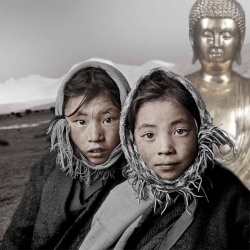Difference between revisions of "The Use Of A Surangama Pendant"
m (Text replacement - "meat" to "meat") |
|||
| Line 5: | Line 5: | ||
The pendants are placed on the [[altar]] before the [[Buddha]]. The [[monks and nuns]] of most {{Wiki|Chinese}} [[Pure Land]] [[temples]] recite the [[Surangama Mantra]] 3 times each morning at 3 o’clock and at the end of the 36th day, the [[community of monks]] have thus invoked the [[Surangama Mantra]] [[108]] times and the pendants are removed and are fully blessed. Blessed or {{Wiki|holy}} pendants have [[magical]] [[powers]] of [[protection]]. | The pendants are placed on the [[altar]] before the [[Buddha]]. The [[monks and nuns]] of most {{Wiki|Chinese}} [[Pure Land]] [[temples]] recite the [[Surangama Mantra]] 3 times each morning at 3 o’clock and at the end of the 36th day, the [[community of monks]] have thus invoked the [[Surangama Mantra]] [[108]] times and the pendants are removed and are fully blessed. Blessed or {{Wiki|holy}} pendants have [[magical]] [[powers]] of [[protection]]. | ||
| − | In general, the pendants may also be purchased at gifts shops on {{Wiki|Chinese}} [[Mahayana]] [[temple]] grounds and on the websites that sell [[Buddhist]] jeweleries. These pendants may or may not be blessed. [[Blessing]] a pendant requires [[mental]] clarity and [[endurance]] of the [[person]] who recites the [[Mantra]], and so if you’re planning on buying one online, ensure it has been blessed. Otherwise, do it yourself by following the guidelines stated above. One thing to bear in [[mind]] though. As [[mental]] clarity and [[endurance]] are the requirement, the [[person]] invoking the [[Mantra]] should be [[vegetarian]]. The first [[Buddhist]] commandment stipulated by the [[Buddhism]] is [[non-violence]], meaning not to conflict any [[pain]] or [[suffering]] to [[sentient beings]]. [[Meat]] eaters or carnivores must think of how their | + | In general, the pendants may also be purchased at gifts shops on {{Wiki|Chinese}} [[Mahayana]] [[temple]] grounds and on the websites that sell [[Buddhist]] jeweleries. These pendants may or may not be blessed. [[Blessing]] a pendant requires [[mental]] clarity and [[endurance]] of the [[person]] who recites the [[Mantra]], and so if you’re planning on buying one online, ensure it has been blessed. Otherwise, do it yourself by following the guidelines stated above. One thing to bear in [[mind]] though. As [[mental]] clarity and [[endurance]] are the requirement, the [[person]] invoking the [[Mantra]] should be [[vegetarian]]. The first [[Buddhist]] commandment stipulated by the [[Buddhism]] is [[non-violence]], meaning not to conflict any [[pain]] or [[suffering]] to [[sentient beings]]. [[Meat]] eaters or carnivores must think of how their meat comes from before they justify themselves to be non-violent and [[compassionate]]! |
If you’re not a [[vegetarian]], try to obtain a pendant blessed by a [[monk]]. All {{Wiki|Chinese}} [[monks]] of the [[Pure Land School]] are {{Wiki|vegetarians}} and they are required to recited the [[Surangama Sutra]] at least three times a day first thing in the morning. | If you’re not a [[vegetarian]], try to obtain a pendant blessed by a [[monk]]. All {{Wiki|Chinese}} [[monks]] of the [[Pure Land School]] are {{Wiki|vegetarians}} and they are required to recited the [[Surangama Sutra]] at least three times a day first thing in the morning. | ||
Latest revision as of 13:55, 30 December 2014
The specific use of the Surangama pendants is to wear them next to the skin when visiting graveyards and funeral homes paying final respect to the dead. Pendants that have been blessed are holy and are said to have the magical power of driving off unclean spirits. Such pendants are usually given free to Buddhists who have given a donation however small to the monastery, or the monk or nun who has personally blessed them. Since the Surangama Sutra and Mantra are Mahayana doctrines, they are usually available in Chinese Mahayana temples.
The pendants are placed on the altar before the Buddha. The monks and nuns of most Chinese Pure Land temples recite the Surangama Mantra 3 times each morning at 3 o’clock and at the end of the 36th day, the community of monks have thus invoked the Surangama Mantra 108 times and the pendants are removed and are fully blessed. Blessed or holy pendants have magical powers of protection.
In general, the pendants may also be purchased at gifts shops on Chinese Mahayana temple grounds and on the websites that sell Buddhist jeweleries. These pendants may or may not be blessed. Blessing a pendant requires mental clarity and endurance of the person who recites the Mantra, and so if you’re planning on buying one online, ensure it has been blessed. Otherwise, do it yourself by following the guidelines stated above. One thing to bear in mind though. As mental clarity and endurance are the requirement, the person invoking the Mantra should be vegetarian. The first Buddhist commandment stipulated by the Buddhism is non-violence, meaning not to conflict any pain or suffering to sentient beings. Meat eaters or carnivores must think of how their meat comes from before they justify themselves to be non-violent and compassionate!
If you’re not a vegetarian, try to obtain a pendant blessed by a monk. All Chinese monks of the Pure Land School are vegetarians and they are required to recited the Surangama Sutra at least three times a day first thing in the morning.
Blessed pendants may also be used as decors by hanging them loosely to handbags, cellphones, or the rear-mirror inside a car. They have the power of protection against accidents.
Power-charged pendants may also help children who wear them excel in their schoolwork because when they’re reciting the Mantra, it is in itself training for mental clarity and endurance.
After use, return the pendant to the home altar where you offer flowers, water, incense, light, fruits and prayers to the Buddha. Do not let it lie about to collect dirt.

